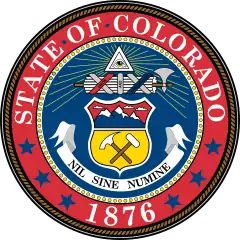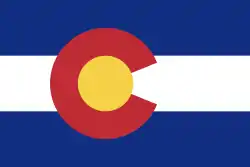Constitution of Colorado
The Constitution of the State of Colorado is the foundation of the laws and government of the U.S. state of Colorado. The current, and only, Colorado State Constitution was drafted on March 14, 1876; approved by Colorado voters on July 1, 1876; and took effect upon the statehood of Colorado on August 1, 1876. From 1876 through 2007, the Colorado Constitution was amended 152 times. The Constitution of Colorado provides and derives its authority from the sovereignty of the people and is the foremost source of state law.[1][2][3] In addition to providing for voting,[4][5] the people of Colorado have reserved initiative of laws and referendum of laws enacted by the legislature to themselves[6] and provided for recall of office holders.[7]
| Constitution of the State of Colorado | |
|---|---|
| Jurisdiction | Colorado, United States |
| Created | 14 April 1876 |
| Ratified | 1 July 1876 |
| Date effective | 1 January 1876 |
| Amendments | 152 |
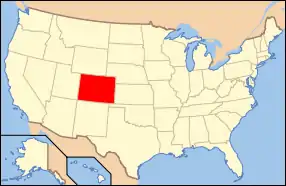
Chronology of the Colorado Constitution
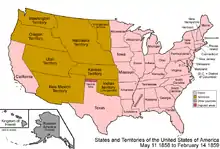
- In June 1858, Green Russell finds placer gold along the South Platte River in western Kansas Territory, inciting the Pike's Peak Gold Rush.
- The first election in the gold fields is held for officers of Arapahoe County, Kansas Territory, on 1859-03-03. Unfortunately, voters are unaware that the Kansas Territorial Legislature split Arapahoe County into six new counties four weeks earlier on 1859-02-07.[8]
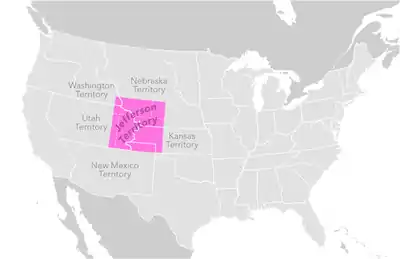
- A constitutional convention meeting in Denver City proposes a new State of Jefferson to govern the gold fields in April 1859.[9]
- The first Jefferson Constitutional Convention meeting in Denver City adopts a proposed Constitution of the State of Jefferson on 1859-08-01. This proposed state constitution is a modified version of the second Constitution of the State of Iowa that was drafted two years earlier.
- Voters of the gold fields reject statehood as premature on 1859-09-05.
- The second Jefferson Constitutional Convention meeting in Denver City adopts a proposed Constitution of the Territory of Jefferson on 1859-10-03. This proposed territorial constitution is a modified version of the rejected state constitution that was drafted two months earlier.
- By a vote of 2163 to 280, voters approve the creation of the free Territory of Jefferson on 1859-10-24. The new territory includes portions of the Territory of Kansas, the Territory of Nebraska, the Territory of New Mexico, the Territory of Utah, and the Territory of Washington. The United States Congress refuses to recognize the new citizen-initiated territory because of the precarious balance of power between the free states and the slave states. The Jefferson Territory governs the region until 1861 with little interference from the federal government.
- On 1860-10-01, Denver City voters approve the Constitution of the People's Government of Denver, an independent municipal government.
- An Act Admitting the State of Kansas to the Union is enacted by Congress and signed into law by President James Buchanan on 1861-01-29. The act includes only the eastern two-thirds of the Territory of Kansas in the new state, and leaves the western portion of the Kansas Territory (claimed by the Territory of Jefferson) unorganized.
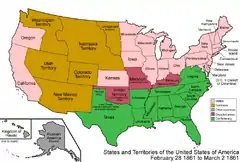
- An Organic Act for the Territory of Colorado is enacted by Congress and signed into law by President James Buchanan on 1861-02-28. The free Territory of Colorado occupies the greater southeastern portion of the extralegal Territory of Jefferson, but is 41% less extensive.
- Abraham Lincoln becomes the 16th President of the United States on 1861-03-04.
- The Confederate attack on Fort Sumter initiates the American Civil War on 1861-04-12. Though the citizens of Colorado hail from many states and countries, the vast majority remain staunchly pro-Union.
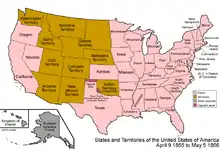
- An Enabling Act for the State of Colorado is enacted by Congress and signed into law by President Abraham Lincoln on 1864-03-21.
- The first Colorado Constitutional Convention meeting in Denver City adopts a proposed Constitution of the State of Colorado on 1864-07-11. This proposed state constitution was inspired by the Wyandotte Constitution of the State of Kansas drafted in 1859.
- By a vote of 1520 to 4672, Colorado voters reject the first proposed Colorado State Constitution on 1864-10-11, primarily because it includes a preselected slate of candidates for state and national office.
- President Lincoln is assassinated and dies on 1865-04-15. The Republican-led Congress soon spars with the new Democratic President Andrew Johnson.
- The second Colorado Constitutional Convention adopts a second proposed Constitution of the State of Colorado on 1865-08-12.
- Colorado voters approve the second proposed Constitution for the State of Colorado on 1865-09-01. Fearing a strengthened Republican majority in Congress, President Andrew Johnson refuses to declare the statehood of Colorado.
- Frustrated by the President's refusal to declare the statehood of Colorado, Congress approves a Colorado Statehood Bill, but President Andrew Johnson vetoes the measure on 1866-05-15.
- Congress approves a second Colorado Statehood Bill, but President Johnson vetoes this bill also on 1867-01-28.
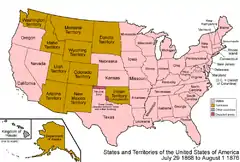
- The United States House of Representatives votes to impeach President Andrew Johnson on 1868-02-24.
- The United States Senate votes to acquit President Andrew Johnson on 1868-05-26.
- Ulysses S. Grant becomes the 18th President of the United States on 1869-03-04
- Congress fails to pass a third Colorado Statehood Bill in 1869.
- Congress fails to pass a fourth Colorado Statehood Bill in 1871.
- Congress fails to pass a fifth Colorado Statehood Bill in 1873.
- In his Fifth Annual Message to Congress on 1873-12-01, President Ulysses S. Grant endorses a second Enabling Act for the State of Colorado.

- The second Enabling Act for the State of Colorado is enacted by Congress and signed into law by President Ulysses S. Grant on 1875-03-03.[10]
- On 1875-10-25, Colorado voters elect delegates to the third Colorado Constitutional Convention.
- The third Colorado Constitutional Convention meeting in Denver adopts a third proposed Constitution of the State of Colorado on 1876-03-14. This proposed state constitution was inspired by the third Constitution of the State of Illinois drafted in 1870, the fourth Constitution of the Commonwealth of Pennsylvania drafted in 1873, and the third Constitution of the State of Missouri drafted in 1875. The Colorado Constitution was, and still is, one of the lengthiest of the state constitutions of the United States.[11][12]
- By a vote of 15,443 to 4039, Colorado voters approve the third proposed Constitution of the State of Colorado on 1876-07-01.
- The nation celebrates the Centennial of the United States on 1876-07-04, despite the shocking news of the Battle of the Little Bighorn.
- President Ulysses S. Grant proclaims that the Territory of Colorado has been accepted into the Union as the State of Colorado on 1876-08-01. The 38th State is immediately nicknamed the Centennial State.[13]
- The Constitution of the State of Colorado has been amended 152 times from 1876 through 2007.
Outline of the Colorado Constitution
Preamble
We, the people of Colorado, with profound reverence for the Supreme Ruler of the Universe, in order to form a more independent and perfect government; establish justice; insure tranquility; provide for the common defense; promote the general welfare and secure the blessings of liberty to ourselves and our posterity, do ordain and establish this constitution for the "State of Colorado".
ARTICLE I. Boundaries
The boundaries of the State of Colorado shall be as follows: Commencing on the thirty-seventh parallel of north latitude, where the twenty-fifth meridian of longitude west from Washington crosses the same; thence north, on said meridian, to the forty-first parallel of north latitude; thence along said parallel, west, to the thirty-second meridian of longitude west from Washington; thence south, on said meridian, to the thirty-seventh parallel of north latitude; thence along said thirty-seventh parallel of north latitude to the place of beginning.
ARTICLE II. Bill of Rights
- Section 1 Vestment of political power.
- Section 2. People may alter or abolish form of government - proviso.
- Section 3. Inalienable Rights.
- Section 4. Religious Freedom.
- Section 5. Freedom of Elections.
- Section 6. Equality of Justice.
- Section 7. Security of Person and Property Searches Seizures Warrants.
- Section 8. Prosecutions Indictment or Information.
- Section 9. Treason Estates of Suicides.
- Section 10. Freedom of Speech and Press.
- Section 11. Ex Post Facto Laws.
- Section 12. No Imprisonment for Debt.
- Section 13. Right to Bear Arms.
- Section 14. Taking Private Property for Private Use.
- Section 15. Taking Property for Public Use Compensation, How Ascertained.
- Section 16. Criminal Prosecutions Rights of Defendant.
- Section 16a. Rights of Crime Victims.
- Section 17. Imprisonment of Witnesses Depositions Form.
- Section 18. Crimes Evidence Against One's Self Jeopardy.
- Section 19. Right to Bail Exceptions.
- Section 20. Excessive Bail, Fines or Punishment.
- Section 21. Suspension of Habeas Corpus.
- Section 22. Military Subject to Civil Power Quartering of Troops.
- Section 23. Trial by Jury Grand Jury.
- Section 24. Right to Assemble and Petition.
- Section 25. Due Process of Law.
- Section 26. Slavery Prohibited.
- Section 27. Property Rights of Aliens.
- Section 28. Rights Reserved Not Disparaged.
- Section 29. Equality of the Sexes.
- Section 30. Right to Vote or Petition on Annexation Enclaves.
- Section 30a. Official Language.
- Section 30b. No Protected Status Based on Sexual Orientation. [Declared in Romer v. Evans to violate the United States Constitution; not in force.
- Section 31. Marriages - valid or recognized. [Declared unconstitutional by the US 10th Circuit Court of Appeals on 6/25/2014 in a case involving Utah Same-Sex Marriage Ban. Also, ruled unconstitutional by Colorado District Judge C. Scott Crabtree on 7/9/2014, US Supreme Court refused to hear appeals on Oct 6, 2014, sustaining ruling of US court of Appeals for the 10th circuit. Colorado Supreme court lifted stay on Oct 7, 2014]
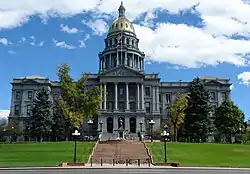
ARTICLE III. Distribution of Powers
The powers of the government of this state are divided into three distinct departments: the legislative, executive, and judicial; and no person or collection of persons charged with the exercise of powers properly belonging to one of these departments shall exercise any power properly belonging to either of the others, except as in this constitution expressly directed or permitted.
ARTICLE IV. Executive Department
- Section 1. Officers Terms of Office.
- Section 2. Governor Supreme Executive.
- Section 3. State Officers Election Returns.
- Section 4. Qualifications of State Officers.
- Section 5. Governor CommanderinChief of Militia.
- Section 6. Appointment of Officers Vacancy.
- Section 7. Governor May Grant Reprieves and Pardons.
- Section 8. Governor May Require Information from Officers Message.
- Section 9. Governor May Convene Legislature or Senate.
- Section 10. Governor May Adjourn Legislature.
- Section 11. Bills Presented to Governor Veto Return.
- Section 12. Governor May Veto Items in Appropriation Bills Reconsideration.
- Section 13. Succession to the Office of Governor and Lieutenant Governor.
- Section 14. Lieutenant Governor President of Senate President Pro Tem (Repealed).
- Section 15. No Lieutenant Governor Who to Act as Governor (Repealed).
- Section 16. Account and Report of Moneys.
- Section 17. Executive Officers to Make Report (Repealed).
- Section 18. State Seal.
- Section 19. Salaries of Officers Fees Paid into Treasury.
- Section 20. State Librarian.
- Section 21. Elected Auditor of State Powers and Duties (Repealed).
- Section 22. Principal Departments.
- Section 23. Commissioner of Insurance.
ARTICLE V. Legislative Department
- Section 1. General Assembly Initiative and Referendum.
- Section 2. Election of Members Oath Vacancies.
- Section 3. Terms of Senators and Representatives.
- Section 4. Qualifications of Members.
- Section 5. Classification of Senators.
- Section 6. Salary and Expenses of Members.
- Section 7. General Assembly Shall Meet When Term of Members Committees.
- Section 8. Members Precluded from Holding Office.
- Section 9. Increase of Salary When Forbidden (Repealed).
- Section 10. Each House to Choose Its Officers.
- Section 11. Quorum.
- Section 12. Each House Makes and Enforces Rules.
- Section 13. Journal Ayes and Noes to be Entered, When.
- Section 14. Open Sessions.
- Section 15. Adjournment for More Than Three Days.
- Section 16. Privileges of Members.
- Section 17. No Law Passed but by Bill Amendments.
- Section 18. Enacting Clause.
- Section 19. When Laws Take Effect Introduction of Bills.
- Section 20. Bills Referred to Committee Printed.
- Section 21. Bill to Contain but One Subject Expressed in Title.
- Section 22. Reading and Passage of Bills.
- Section 22a. Caucus Positions Prohibited Penalties.
- Section 22b. Effect of Sections 20 and 22a.
- Section 23. Vote on Amendments and Report of Committee.
- Section 24. Revival, Amendment or Extension of Laws.
- Section 25. Special Legislation Prohibited.
- Section 25a. Eighthour Employment.
- Section 26. Signing of Bills.
- Section 27. Officers and Employees Compensation.
- Section 28. Extra Compensation to Officers, Employees, or Contractors Forbidden.
- Section 29. Contracts for Facilities and Supplies.
- Section 30. Salary of Governor and Judges to be Fixed by Legislature Term Not to be Extended or Salaries Increased or Decreased (Repealed).
- Section 31. Revenue Bills.
- Section 32. Appropriation Bills.
- Section 33. Disbursement of Public Money.
- Section 34. Appropriations to Private Institutions Forbidden.
- Section 35. Delegation of Power.
- Section 36. Laws on Investment of Trust Funds.
- Section 37. Change of Venue (Repealed).
- Section 38. No Liability Exchanged or Released.
- Section 39. Orders and Resolutions Presented to Governor.
- Section 40. Bribery and Influence in General Assembly.
- Section 41. Offering, Giving, Promising Money or Other Consideration (Repealed).
- Section 42. Corrupt Solicitation of Members and Officers (Repealed).
- Section 43. Member Interested Shall Not Vote.
Congressional and Legislative Apportionments
- Section 44. Representatives in Congress.
- Section 45. General Assembly.
- Section 46. Senatorial and Representative Districts.
- Section 47. Composition of Districts.
- Section 48. Revision and Alteration of Districts Reapportionment Commission.
- Section 49. Appointment of State Auditor Term Qualifications Duties.
- Section 50. Public Funding of Abortion Forbidden.
ARTICLE VI. Judicial Department
- Section 1. Vestment of Judicial Power.
Supreme Court
- Section 2. Appellate Jurisdiction.
- Section 3. Original Jurisdiction Opinions.
- Section 4. Terms.
- Section 5. Personnel of Court Departments Chief Justice.
- Section 6. Election of Judges (Repealed).
- Section 7. Term of Office.
- Section 8. Qualifications of Justices.
District Courts
- Section 9. District Courts Jurisdiction.
- Section 10. Judicial Districts District Judges.
- Section 11. Qualifications of District Judges.
- Section 12. Terms of Court.
District Attorneys
- Section 13. District Attorneys Election Term Salary Qualifications.
Probate and Juvenile Courts
- Section 14. Probate Court Jurisdiction Judges Election Term Qualifications.
- Section 15. Juvenile Court Jurisdiction Judges Election Term Qualifications.
County Courts
- Section 16. County Judges Terms Qualifications.
- Section 17. County Courts Jurisdiction Appeals.
Miscellaneous
- Section 18. Compensation and Services.
- Section 19. Laws Relating to Courts Uniform.
- Section 20. Vacancies.
- Section 21. Rulemaking Power.
- Section 22. Process Prosecution In Name of People.
- Section 23. Retirement and Removal of Justices and Judges.
- Section 24. Judicial Nominating Commissions.
- Section 25. Election of Justices and Judges.
- Section 26. Denver County Judges.
ARTICLE VII. Suffrage and Elections
- Section 1. Qualifications of Elector.
- Section 1a. Qualifications of Elector Residence on Federal Land.
- Section 2. Suffrage to Women (Repealed).
- Section 3. Educational Qualifications of Elector (Deleted by amendment).
- Section 4. When Residence Does Not Change.
- Section 5. Privilege of Voters.
- Section 6. Electors Only Eligible to Office.
- Section 7. General Election.
- Section 8. Elections by Ballot or Voting Machine.
- Section 9. No Privilege to Witness in Election Trial.
- Section 10. Disfranchisement During Imprisonment.
- Section 11. Purity of Elections.
- Section 12. Election Contests By Whom Tried.
ARTICLE VIII. State Institutions
- Section 1. Established and Supported by State.
- Section 2. Seat of Government Where Located.
- Section 3. Seat of Government How Changed.
- Section 4. Appropriation for Capitol Building (Repealed).
- Section 5. Educational Institutions.
ARTICLE IX. Education
- Section 1. Supervision of Schools Board of Education.
- Section 2. Establishment and Maintenance of Public Schools.
- Section 3. School Fund Inviolate.
- Section 4. County Treasurer to Collect and Disburse.
- Section 5. Of What School Fund Consists.
- Section 6. County Superintendent of Schools.
- Section 7. Aid to Private Schools, Churches, Sectarian Purpose, Forbidden.
- Section 8. Religious Test and Race Discrimination Forbidden Sectarian Tenets.
- Section 9. State Board of Land Commissioners.
- Section 10. Selection and Control of Public Lands.
- Section 11. Compulsory Education.
- Section 12. Regents of University.
- Section 13. President of University.
- Section 14. Control of University (Repealed).
- Section 15. School Districts Board of Education.
- Section 16. Textbooks in Public Schools.
- Section 17. Education - Funding.
ARTICLE X. Revenue
- Section 1. Fiscal Year.
- Section 2. Tax Provided for State Expenses.
- Section 3. Uniform Taxation Exemptions.
- Section 4. Public Property Exempt.
- Section 5. Property Used for Religious Worship, Schools and Charitable Purposes Exempt.
- Section 6. Selfpropelled Equipment, Motor Vehicles, and Certain Other Movable Equipment.
- Section 7. Municipal Taxation by General Assembly Prohibited.
- Section 8. No County, City, Town to be Released.
- Section 9. Relinquishment of Power to Tax Corporations Forbidden.
- Section 10. Corporations Subject to Tax.
- Section 11. Maximum Rate of Taxation.
- Section 12. Public Funds Report of State Treasurer.
- Section 13. Making Profit on Public Money Felony.
- Section 14. Private Property Not Taken for Public Debt.
- Section 15. Boards of Equalization Duties Property Tax Administrator.
- Section 16. Appropriations Not to Exceed Tax Exceptions.
- Section 17. Income Tax.
- Section 18. License Fees and Excise Taxes Use of.
- Section 19. State Income Tax Laws by Reference to United States Tax Laws.
- Section 20. The Taxpayer's Bill of Rights.
- Section 21. Tobacco Taxes for Health Related Purposes.
ARTICLE XI. Public Indebtedness
- Section 1. Pledging Credit of State, County, City, Town or School District Forbidden.
- Section 2. No Aid to Corporations No Joint Ownership by State, County, City, Town, or School District.
- Section 2a. Student Loan Program.
- Section 3. Public Debt of State Limitations.
- Section 4. Law Creating Debt.
- Section 5. Debt for Public Buildings How Created.
- Section 6. Local Government Debt.
- Section 7. State and Political Subdivisions May Give Assistance to Any Political Subdivision.
- Section 8. City Indebtedness; Ordinance, Tax, Water Obligations Excepted.
- Section 9. This Article Not to Affect Prior Obligations (Repealed).
- Section 10. 1976 Winter Olympics (Deleted by Amendment).
ARTICLE XII. Officers
- Section 1. When Office Expires Suspension by Law.
- Section 2. Personal Attention Required.
- Section 3. Defaulting Collector Disqualified from Office.
- Section 4. Disqualifications from Holding Office of Trust or Profit.
- Section 5. Investigation of State and County Treasurers.
- Section 6. Bribery of Officers Defined.
- Section 7. Bribery Corrupt Solicitation.
- Section 8. Oath of Civil Officers.
- Section 9. Oaths Where Filed.
- Section 10. Refusal to Qualify Vacancy.
- Section 11. Elected Public Officers Term Salary Vacancy.
- Section 12. Duel Disqualifies for Office (Deleted by Amendment).
- Section 13. Personnel System of State Merit System.
- Section 14. State Personnel Board State Personnel Director.
- Section 15. Veterans' Preference.
ARTICLE XIII. Impeachments
- Section 1. House Impeach Senate Try Conviction When Chief Justice Presides.
- Section 2. Who Liable to Impeachment Judgment No Bar to Prosecution.
- Section 3. Officers Not Subject to Impeachment Subject to Removal.
ARTICLE XIV. Counties
- Section 1. Counties of State.
- Section 2. Removal of County Seats.
- Section 3. Striking Off Territory Vote.
- Section 4. New County Shall Pay Proportion of Debt.
- Section 5. Part Stricken Off Pay Proportion of Debt.
County Officers
- Section 6. County Commissioners Election Term.
- Section 7. Officers Compensation (Repealed).
- Section 8. County Officers Election Term Salary.
- Section 9. Vacancies How Filled.
- Section 10. Elector Only Eligible to County Office.
- Section 11. Justices of the Peace Constables (Repealed).
- Section 12. Other Officers.
- Section 13. Classification of Cities and Towns.
- Section 14. Existing Cities and Towns May Come Under General Law.
- Section 15. Compensation and Fees of County Officers.
- Section 16. County Home Rule.
- Section 17. Service Authorities.
- Section 18. Intergovernmental Relationships.
ARTICLE XV. Corporations
- Section 1. Unused Charters or Grants of Privilege.
- Section 2. Corporate Charters Created by General Law.
- Section 3. Power to Revoke, Alter or Annul Charter.
- Section 4. Railroads Common Carriers Construction Intersection.
- Section 5. Consolidation of Parallel Lines Forbidden.
- Section 6. Equal Rights of Public to Transportation.
- Section 7. Existing Railroads to File Acceptance of Constitution.
- Section 8. Eminent Domain Police Power Not to be Abridged.
- Section 9. Fictitious Stock, Bonds Increase of Stock.
- Section 10. Foreign Corporations Place Agent.
- Section 11. Street Railroads Consent of Municipality.
- Section 12. Retrospective Laws Not to be Passed.
- Section 13. Telegraph Lines Consolidation.
- Section 14. Railroad or Telegraph Companies Consolidating with Foreign Companies.
- Section 15. Contracts with Employees Releasing from Liability Void.
ARTICLE XVI. Mining and Irrigation
Mining
- Section 1. Commissioner of Mines.
- Section 2. Ventilation Employment of Children.
- Section 3. Drainage.
- Section 4. Mining, Metallurgy, in Public Institutions.
Irrigation
- Section 5. Water of Streams Public Property.
- Section 6. Diverting Unappropriated Water Priority Preferred Uses.
- Section 7. Rightofway for Ditches, Flumes.
- Section 8. County Commissioners to Fix Rates for Water, When.
ARTICLE XVII. Militia
- Section 1. Persons Subject to Service.
- Section 2. Organization Equipment Discipline.
- Section 3. Officers How Chosen.
- Section 4. Armories.
- Section 5. Exemption in Time of Peace.
ARTICLE XVIII. Miscellaneous
- Section 1. Homestead and Exemption Laws.
- Section 2. Lotteries Prohibited Exceptions.
- Section 3. Arbitration Laws.
- Section 4. Felony Defined.
- Section 5. Spurious and Drugged Liquors Laws Concerning.
- Section 6. Preservation of Forests.
- Section 7. Land Value Increase Arboreal Planting Exempt.
- Section 8. Publication of Laws.
- Section 9. Limited Gaming Permitted.
- Section 9a. U.S. Senators and Representatives Limitation on Terms.
- Section 10. Severability of Constitutional Provisions.
- Section 11. Elected Government Officials—Limitations on Terms.
- Section 12. Congressional Term Limits Amendment.
- Section 12a. Congressional Term Limits Declaration.
- Section 13. Prohibited Methods of Taking Wildlife.
- Section 14. Medical use of marijuana for persons suffering from debilitating medical conditions.
- Section 15. State Minimum Wage Rate.
- Section 16. Personal Use and Regulation of Marijuana[15]
ARTICLE XIX. Amendments
- Section 1. Constitutional Convention How Called.
- Section 2. Amendments to Constitution How Adopted.
ARTICLE XX. Home Rule Cities and Towns
- Section 1. Incorporated.
- Section 2. Officers.
- Section 3. Transfer of Government.
- Section 4. First Charter.
- Section 5. New Charters, Amendments or Measures.
- Section 6. Home Rule for Cities and Towns.
- Section 7. City and County of Denver Single School District Consolidations.
- Section 8. Conflicting Constitutional Provisions Declared Inapplicable.
- Section 9. Procedure and Requirements for Adoption.
- Section 10. City and county of Broomfield - created
- Section 11. Officers - city and county of Broomfield
- Section 12. Transfer of government
- Section 13. Sections self-executing - appropriations
ARTICLE XXI. Recall from Office
- Section 1. State Officers May be Recalled.
- Section 2. Form of Recall Petition.
- Section 3. Resignation Filling Vacancy.
- Section 4. Limitation Municipal Corporations May Adopt, When.
ARTICLE XXII. Intoxicating Liquors
- Section 1. Repeal of Intoxicating Liquor Laws.
ARTICLE XXIII. Publication of Legal Advertising
- Section 1. Publication of Proposed Constitutional Amendments and Initiated and Referred Bills.
ARTICLE XXIV. Old Age Pensions
- Section 1. Fund Created.
- Section 2. Moneys Allocated to Fund.
- Section 3. Persons Entitled to Receive Pensions.
- Section 4. The State Board of Public Welfare to Administer Fund.
- Section 5. Revenues for Old Age Pension Fund Continued.
- Section 6. Basic Minimum Award.
- Section 7. Stabilization Fund and Health and Medical Care Fund.
- Section 8. Fund to Remain Inviolate.
- Section 9. Effective Date.
ARTICLE XXV. Public Utilities
In addition to the powers now vested in the General Assembly of the State of Colorado, all power to regulate the facilities, service and rates and charges therefor, including facilities and service and rates and charges therefor within home rule cities and home rule towns, of every corporation, individual, or association of individuals, wheresoever situate or operating within the State of Colorado, whether within or without a home rule city or home rule town, as a public utility, as presently or as may hereafter be defined as a public utility by the laws of the State of Colorado, is hereby vested in such agency of the State of Colorado as the General Assembly shall by law designate.
Until such time as the General Assembly may otherwise designate, said authority shall be vested in the Public Utilities Commission of the State of Colorado; provided however, nothing herein shall affect the power of municipalities to exercise reasonable police and licensing powers, nor their power to grant franchises; and provided, further, that nothing herein shall be construed to apply to municipally owned utilities.
ARTICLE XXVI. Nuclear Detonations
- Section 1. Nuclear Detonations Prohibited Exceptions.
- Section 2. Election Required.
- Section 3. Certification of Indemnification Required.
- Section 4. Article Selfexecuting.
- Section 5. Severability.
ARTICLE XXVII. Great Outdoors Colorado Program
- Section 1. Great Outdoors Colorado Program.[16]
- Section 2. Trust Fund Created.
- Section 3. Moneys Allocated to Trust Fund.
- Section 4. Fund to Remain Inviolate.
- Section 5. Trust Fund Expenditures.
- Section 6. The State Board of the Great Outdoors Colorado Trust Fund.
- Section 7. No effect on Colorado water law.
- Section 8. No Substitution Allowed.
- Section 9. Eminent Domain.
- Section 10. Payment in lieu of Taxes.
- Section 11. Effective Date.
ARTICLE XXVIII. Campaign and Political Finance
- Section 1. Purpose and findings.
- Section 2. Definitions.
- Section 3. Contribution limits.
- Section 4. Voluntary campaign spending limits.
- Section 5. Independent expenditures.
- Section 6. Electioneering communications.
- Section 7. Disclosure.
- Section 8. Filing - where to file - timeliness.
- Section 9. Duties of the secretary of state - enforcement.
- Section 10. Sanctions.
- Section 11. Conflicting provisions declared inapplicable.
- Section 12. Repeal of conflicting statutory provisions.
- Section 13. Applicability and Effective Date.
- Section 14. Severability.
ARTICLE XXIX. Ethics in Government
- Section 1. Purposes and findings.
- Section 2. Definitions.
- Section 3. Gift ban.
- Section 4. Restrictions on representation after leaving office.
- Section 5. Independent ethics commission.
- Section 6. Penalty.
- Section 7. Counties and municipalities.
- Section 8. Conflicting provisions declared inapplicable.
- Section 9. Legislation to facilitate article.
Schedule
- Section 1. All Laws Remain Until Repealed.
- Section 2. Contracts Recognizances Indictments.
- Section 3. Territorial Property Vests in State.
- Section 4. Duty of General Assembly.
- Section 5. Supreme and District Courts Transition.
- Section 6. Judges District Attorneys Term Commence on Filing Oath.
- Section 7. Seals of Supreme and District Courts.
- Section 8. Probate Court County Court.
- Section 9. Terms Probate Court, Probate Judge, Apply to County Court, County Judge.
- Section 10. County and Precinct Officers.
- Section 11. Vacancies in County Offices.
- Section 12. Constitution Takes Effect on President's Proclamation.
- Section 13. First Election, Contest.
- Section 14. First Election Canvass.
- Section 15. Senators Representatives Districts.
- Section 16. Congressional Election Canvass.
- Section 17. General Assembly, First Session Restrictions Removed.
- Section 18. First General Assembly Canvass.
- Section 19. Presidential Electors, 1876.
- Section 20. Presidential Electors After 1876.
- Section 21. Expenses of Convention.
- Section 22. Recognizances, Bonds, Payable to People Continue.
See also
References
- Article II of the Constitution of Colorado on Justia.Com, accessed September 21, 2010
- Section 1, Article II, Constitution of Colorado
- Section 2, Article II, Constitution of Colorado
- Section 5, Article II, Constitution of Colorado
- Article VII, Constitution of Colorado
- Section 1, Article V, Constitution of Colorado
- Article XXI, Constitution of Colorado
- Wharton, J.E.; Wilhelm, D.O. (1866). "History of Denver with a Full and Complete Business Directory". RootsWeb.com. Leona L. Gustafson. Retrieved 2008-08-14.
- Colorado, State of (2001-04-18). "Colorado State Government History". State of Colorado, Department of Personnel and Administration, State Archives. Retrieved 2008-08-14.
- Forty-third United States Congress (1875-03-03). "An Act to Enable the People of Colorado to Form a Constitution and State Government, and for the Admission of the Said State into the Union on an Equal Footing with the Original States". Archived from the original (PDF) on 2008-05-07. Retrieved 2008-08-14.
- Colorado, State of (1876-08-01). "Constitution of the State of Colorado" (PDF). State of Colorado, Department of Personnel and Administration, State Archives. Retrieved 2008-08-14.
- Oesterle, Dale A.; Richard B. Collins (2002). The Colorado State Constitution: A Reference Guide. Greenwood Publishing Group. ISBN 978-0-313-30849-9. Retrieved 2008-08-14.
- President of the United States of America (1876-08-01). "Proclamation of the Admission of Colorado to the Union" (php). The American Presidency Project. Retrieved 2008-08-14.
- Colorado, State of. "Constitution of the State of Colorado". Michie's Legal Resources. Archived from the original on 2008-08-14. Retrieved 2008-08-14.
- "Colorado Constitution article XVIII section 16". LexisNexis Public. Retrieved 22 February 2013.
- "ARTICLE XXVII. Great Outdoors Colorado Program", accessed 20 January 2019.
